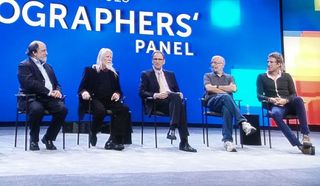Encryption Pioneers Disagree About Apple-FBI Case
The cryptographers whose work made the secure Internet possible can't agree on whom to support in the case of Apple vs. the FBI.
SAN FRANCISCO — Four prominent cryptographers, who together developed encryption standards now used in millions of online secure transactions every day, debated and disagreed about the Apple-FBI case during a panel discussion at the RSA security conference here Tuesday morning (March 1).

"I don't think this case is about backdoors," said Adi Shamir, who with his MIT colleagues Leonard Adleman and Ron Rivest developed the RSA encryption algorithm in 1977. "The FBI is asking Apple to do something very specific. It's got nothing to do with placing backdoors in millions of phones around the world."
Martin Hellman, who developed the Diffie-Hellman encryption-key exchange with Whitfield Diffie at Stanford in 1976, disagreed, as did Rivest and Diffie.
"If this becomes precedent, there will be thousands of requests from every law-enforcement agency in this country and in other countries," Hellman said. "I will be signing a legal brief supporting Apple. But if we get into the phone, I want them [the FBI] to tell us what was on it. But I suspect they will keep that secret."
MORE: Apple vs. FBI: What's Going On and Why It Matters
Apple has refused to obey a court order to help the FBI decrypt an iPhone used by Syed Rizwan Farook, who with his wife killed 14 of his co-workers in San Bernardino, California on Dec. 2, 2015 in what was almost certainly a terrorist attack.
"Congress would have to pass a law" to resolve this case, Rivest said. "The good of the country depends on having strong secure privacy."
Sign up to get the BEST of Tom’s Guide direct to your inbox.
Upgrade your life with a daily dose of the biggest tech news, lifestyle hacks and our curated analysis. Be the first to know about cutting-edge gadgets and the hottest deals.
"We are moving into an era where interaction between people and machines is key," Diffie said. "Who controls machines is he who controls the world."
Shamir, the only non-American on the panel, said that he couldn't disagree with that sentiment, but said that "Apple goofed."
"They put themselves in a position where they could state they could no longer help," he added. "But they failed because they didn't close this particular loophole in which Apple can help the FBI. Apple should close this loophole, and then they can really make the argument."
Moxie Marlinspike, a younger cryptographer who spearheaded the development of the free Signal encrypted messaging and voice-call app, praised Apple for standing up to the FBI.
"We're having this conversation because Apple decided to make a product that actually serviced their customers," Marlinspike said. "We should applaud them for that."
"I might have an unpopular opinion," he added. "Chances are there's nothing on this device. The FBI already has a tremendous amount of information. But they're asking us in case there's a bit more."
Shamir, however, insisted that Apple had made a mistake in choosing this case on which to make a stand.
"Almost everything is aligned in favor of the FBI," Shamir said. "My advice would have been that Apple should have complied this time and waited for a better case that was not so favorable to the FBI. But Apple is right in fighting this all the way to the Supreme Court."
During the panel, Diffie and Hellman received the 2015 Turing Award, an annual prize widely regarded as the Nobel Prize of computing. Rivest, Shamir and Adleman shared the award in 2002.
Hellman said he would be using his half of the $1 million prize to help combat the proliferation of nuclear weapons. He also stressed that the technology industry and the government should try to find common ground, as he himself had with a former director of the NSA who initially opposed the publicizing of the Diffie-Hellman key exchange.
"We need to work with the FBI and the NSA," Hellman said. "Admiral Bobby Inman may have wanted to throw Whit and me in jail back in the '70s, but he and I are now good friends. It is possible for old enmities to blossom into friendships. I would encourage us to put ourselves in the shoes of these agencies to reach conclusions that help the country as a whole."
Paul Wagenseil is a senior editor at Tom's Guide focused on security and privacy. He has also been a dishwasher, fry cook, long-haul driver, code monkey and video editor. He's been rooting around in the information-security space for more than 15 years at FoxNews.com, SecurityNewsDaily, TechNewsDaily and Tom's Guide, has presented talks at the ShmooCon, DerbyCon and BSides Las Vegas hacker conferences, shown up in random TV news spots and even moderated a panel discussion at the CEDIA home-technology conference. You can follow his rants on Twitter at @snd_wagenseil.

